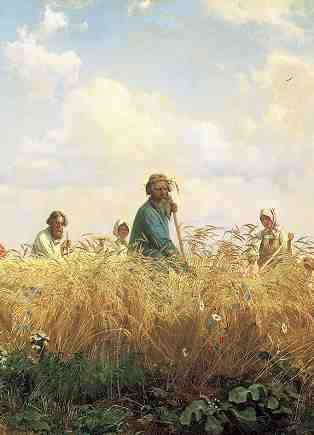Apollon Maikov (1821-97) was educated at St. Petersburg, and from 1842 to 1845 studied art in France and Italy. On returning to Russia, he became a civil servant and worked at the Rumiantsev Museum in Moscow. His was a markedly gifted family. An 18th century ancestor was a noted poet; his father was a painter and a brother a literary critic. Maikov sympathized with the French art-for-art's-sake poets and, like Gautier and his followers, was often inspired by classical antiquity. Maikov's work is severely classical in the main, unsentimental but closely observed. His later travel impressions incorporated figures met in journeys around Normandy, the Alps and Naples. {1}

Maikov grew up on his grandmother's estate, and retained a warm affection for the steady rhythms of country life, the good humour of this piece quietly increasing from stanza to stanza.
It's also more carefully crafted than first appears, and was one of a series that Maikov wrote commemorating all things Russian at the outbreak of the Crimean War.
The poem was written in 1856 and published in the 'Snowdrop' two years later. It soon joined the repertoire of much-loved children's literature, and is one of the first poems
that schoolchildren commonly learn in Russia today. {2}
Сенокос
Пахнет сеном над лугами…
В песне душу веселя,
Бабы с граблями рядами
Ходят, сено шевеля.
Там — сухое убирают:
Мужички его кругом
На́-воз вилами кидают…
Воз растет, растет, как дом…
В ожиданьи конь убогий
Точно вкопанный, стоит…
Уши врозь, дугою ноги
И как будто стоя спит…
Только жучка удалая,
В рыхлом сене, как в волнах,
То взлетая, то ныряя,
Скачет, лая впопыхах.
1856
The TTS Audio Recording is:
The poem is in iambic tetrameters rhymed AbAb:
Па́хнет се́ном над луга́ми… 4A
В пе́сне ду́шу веселя́, 4b
Ба́бы с гра́блями ряда́ми 4A
Хо́дят, се́но шевеля́. 4b
Across the fields the scent of hay,
and women sing, a happy sound:
with rakes to hand as best they may
they turn and toss the hay around.
Once gathered in, there dry and clean,
the men-folk have their pitchforks fly,
and piled on lumbering carts are seen
vast heaps of hay a whole house high.
The waiting horse looks miserable,
as though it has one pose to keep:
wide ears apart, arched legs to pull
but for the present stands asleep.
Excitedly a dog tears round,
through hay in waves has zigzag raced;
and barking, leaping, in one bound
goes racing off in frenzied haste.
1. Bristol, E., A History of Russian Poetry (1991, O.U.P.) 144-5.
2. Анализ стихотворения «Сенокос» Майкова. Brief critical article in Russian.
3. Haymaking by Apollon Maikov. Cornford and Salaman translation and notes
Russian poem translations on this site: listing.